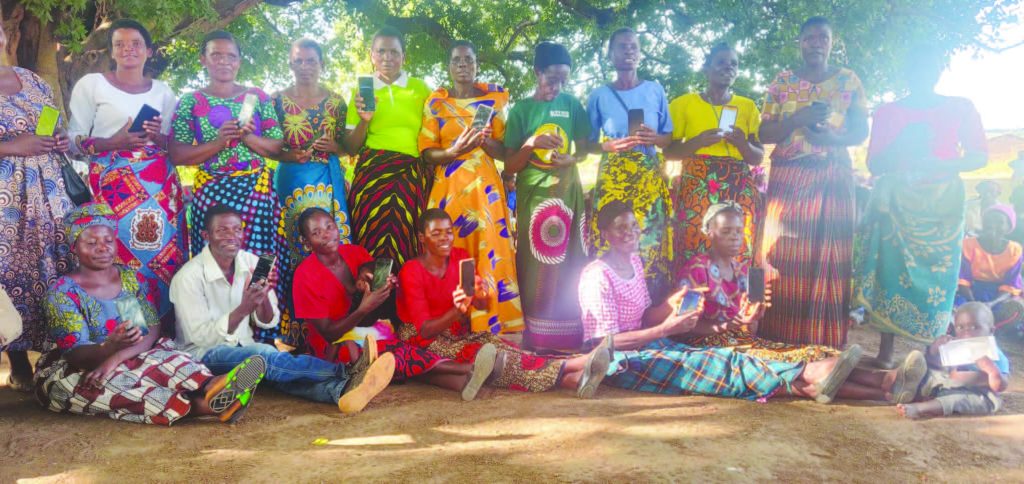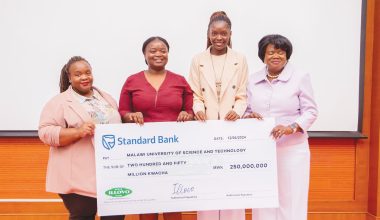Women embrace technology to improve crop yields
Virginia Francis, 42, is one of the pioneer farmers in Traditional Authority (T/A) Kabudula, Lilongwe, to embrace digital innovation to revolutionise the agriculture industry.
Using the Z’wardy App on her smartphone, she manages her farm operations by among others maintaining detailed farm records, conducting precise farm mapping and tracking access to essential farm inputs and markets.

Under the Pathways to Prosperity Programme implemented by Kvuno, a social- enterprise working in partnership with Solidaridad, the soya beans farmer boasts says this digital approach has not only streamlined her farming processes, but also enhanced productivity and decision-making.
Solidaridad is an international organisation supporting farmers in Malawi.
Francis says: “I have experienced a tremendous economic turnaround since I started using this application when the programme rolled out in my area in 2021.”
The lead farmer, now managing 30 women farmers and five males, started with just 25 kilogrammes of soya seed in 2021 on her one hectare where she harvested 35 bags weighing 50 kilogrammes each.
“That marked my turn around. I am now harvesting up to 200 bags per season, pulled some resources towards other crops such as maize, ultimately alleviating persistent hunger at my household.
“Additionally, I have managed to build a beautiful house and I am funding my daughter’s secondary education,” says the mother of four.
The Z’wardy service is available to farmers who possess a Solidaridad Farmer QR code ID, which is issued by Kvuno extension staff after registering the farmer and mapping their fields using the Open Data Kit (ODK) Collect app.
Once the farmers are registered, their information is captured in the Kvuno system and this allows them to receive satellite imagery of their farm.
ODK is an open-source suite of tools that allows data collection using Android mobile devices and data submission to an online server, even without an Internet connection or mobile carrier service at the time of data collection.
The farmers streamline the data collection process with ODK Collect by replacing traditional paper forms with electronic forms that allow text, numeric data, GPS, photo, video, barcodes, and audio uploads to an online server.
Through the project, the farmers also do seed multiplication and facilitate market access for their produce through streamlined processes from warehouse management to off-takers.
Violet Masaka says before the project, they were just casual farmers without any records to determine whether they were making profits or not.
“If we perform well in record keeping, Kvuno rewards us with smartphones, radios, chemical sprayers and bicycles, further incentivising the adoption of digital practices by farmers,” she says.
Kvuno hub Lilongwe lead Grace Msiska boasts of how the incentive part has motivated more farmers to embrace the technology, outlining plans to extend the project to more farmers in Malawi.
“We are currently working with 100 farmers in T/A Kabudula, but we plan to extend the project,” she says.
Solidaridad Malawi senior programmes manager Given Phiri says apart from empowering farmers to become independent and self-sufficient, the project is also bridging the digital divide by promoting digital literacy among rural farmers.
Solidaridad Southern Africa head of programme quality and impact Talentus Mthunzi says their main is to create wealth among smallholder farmers and offer holistic solutions that are co-created with communities, experts and farmers.
He highlighted low literacy levels as the major challenge in the implementation of the project; hence, they plan to
incorporate young people in secondary schools, to support those having challenges working on the application.
Ministry of Agriculture deputy director for crop development Martin Gausi hailed the project, stressing the need for Malawi to diversify its agricultural portfolio to ensure economic stability.
According to the World Bank, about 80 percent of Malawi’s population, mostly women, relies on agriculture for their livelihoods.
However, smallholder farmers often lack access to modern farming inputs, financial services,and extension support, leading to lower productivity and income levels compared to larger commercial farms.
Solidaridad’s Pathways to Prosperity Programme strives to tackle such deep-rooted inequalities through a transformative system and fostering sustainable development in Malawi’s agricultural sector particularly among women.
By investing in innovative solutions such as digital technologies for farm management, climate-smart agriculture practices, and inclusive financial services, Malawi can empower women to improve their livelihoods, enhance food security, and contribute to overall economic growth.
Virginia and other farmers’ success stories reflect the transformative potential of digital innovation in agriculture.






My spouse and I stumbled over here by a different
website and thought I might check things out. I like what I
see so now i’m following you. Look forward to checking
out your web page repeatedly.